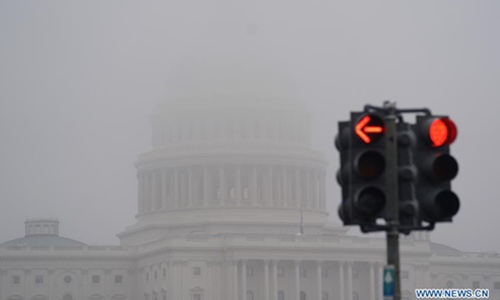HOME >> OPINION
Suppressing Chinese media bodes ill for bilateral ties
Source:Global Times Published: 2020/2/19 21:58:02

The Capitol Hill is shrouded in fog in Washington D.C., the US, on Tuesday. US President Donald Trump on Tuesday sent a six-page letter to House Speaker Nancy Pelosi, slamming the House Democrats impeachment effort as an "illegal, partisan attempted coup." Photo: Xinhua
The US announced Tuesday it would treat five major Chinese state-run news agencies with US operations as foreign missions, requiring them to register with the US State Department their employees and properties.
The extent to which this US move will affect the five media entities remains to be seen. The US claimed that this designation would not impede these agencies' journalistic activities. But there are various restrictive provisions in the Foreign Missions Act of the US. Thus, the limitations these media outlets face in the future will be flexible. There may be difficulties for them to send reporters to the US and hire local staff.
On Wednesday afternoon Beijing time, China's Foreign Ministry announced it would revoke the press credentials of three Wall Street Journal reporters working in Beijing, as the WSJ had previously published a racist commentary entitled "China Is the Real Sick Man of Asia" and had refused to apologize. According to the writer, the commentary was headlined by the paper's editors, not himself.
There are no connections between the two events, but it is not completely coincidental that they happened at about the same time. Together they show the ideological conflict between China and the US is intensifying. The two countries' values are drifting apart, and they are acting more resolutely in accordance with their own respective principles. This is not a good sign. It might be another clue of a more turbulent great power relationship in the 21st century.
Generally, the US is more aggressive and offensive. In addition to preventing Chinese media from "penetrating" the US as claimed, the US State Department is using its decision to declare Washington's opposition to the Chinese political system, amplify the differences between the Western and Chinese systems, and distort the image of the Chinese government.
China has always been restrained in handling frictions with the US. It always bears in mind the overall interests and has never stirred up disputes with the US. Almost every conflict has been provoked by the US.
Instead of expressing sympathy and help in China's fight against the COVID-19, the WSJ used racism to attack China. China imposed sanction because the newspaper has gone beyond endurance.
Some US political elites have been strengthening political mobilization against China and trying to rope in more Western forces to oppose China. Their most prominent act is to attack the leadership of the Communist Party of China and blacken China's political system. They obviously hope to suppress other countries' desire to expand cooperation with China by mobilizing people's political aversion to China.
Practice is the sole criterion of truth. Whether China's governance is good or evil depends on what it has brought to the Chinese people. Over the past few decades, China, the world's most populous country, has achieved comprehensive and visible progress. Chinese people's livelihood has been completely reshaped. How unreasonable and shameless it is to demonize the political system of such a country.
Recently, some US elites have tried to alienate the relationship between Chinese people and the government. They also tried to strengthen the alliance of Western values. But the US' unethical and undisguised strategic selfishness is much too obvious. Just look at how Washington has failed to make its allies refuse Huawei in 5G construction. People will understand how impractical it is for the US to isolate China.
The US should not provoke Chinese media with no limits. The US media also needs to conduct business in China. If the US goes too far, US media agencies in China will be the most worried.
China-US ties will determine international relations in the 21st century. The ruling elites in the US should not be sinners in the 21st century.
Posted in: EDITORIAL